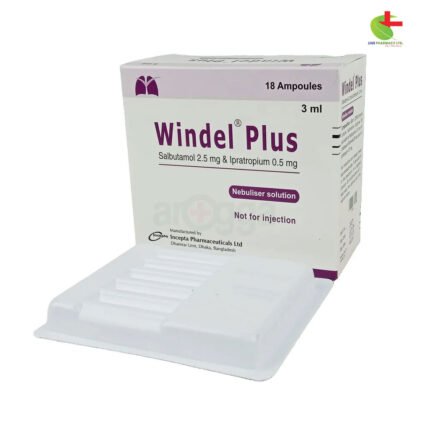Sporium Solution
2,385.00৳ Bottle (50ml)
- Sporium is an immunosuppressant primarily used in solid organ and bone marrow transplantation to prevent rejection.
- It is also indicated for non-transplant conditions like endogenous uveitis, nephrotic syndrome, rheumatoid arthritis, psoriasis, and atopic dermatitis.
- Cyclosporine, the active ingredient, selectively targets lymphocytes without suppressing overall immune function.
- Regular monitoring is required due to potential side effects like renal dysfunction, hypertension, and increased risk of infections.
 Brand
Brand
|
Incepta Pharmaceuticals Ltd |
|---|---|
 Generics
Generics
|
Cyclosporine |
 Type
Type
|
Syrup |
Indications
Sporium is prescribed for:
- Transplantation:
- Solid organ transplants
- Bone marrow transplants
- Non-transplant uses:
- Endogenous uveitis
- Nephrotic syndrome
- Rheumatoid arthritis
- Psoriasis
- Atopic dermatitis
Please use medication as directed by a registered physician.
Pharmacology
Cyclosporine, the active ingredient in Sporium, is a cyclic polypeptide composed of 11 amino acids. It is a powerful immunosuppressant that extends the lifespan of allogeneic transplants, including skin, heart, kidney, pancreas, bone marrow, small intestine, and lung. Cyclosporine specifically and reversibly targets lymphocytes without suppressing blood cell formation or affecting phagocytic cell function, which makes it safer in terms of infection risk compared to other immunosuppressive treatments.
Dosage & Administration
- Solid Organ Transplantation:
Start with 10-15 mg/kg, divided into two doses, beginning 12 hours before surgery and continuing for 1-2 weeks post-operation. Gradually adjust to a maintenance dose of 2-6 mg/kg in two divided doses. - Bone Marrow Transplantation:
Start with 12.5-15 mg/kg, divided into two doses, beginning the day before the transplant. Continue with 12.5 mg/kg in two doses for at least 3 months, ideally 6 months, before tapering off the medication over one year. - Endogenous Uveitis:
Start with 5 mg/kg per day, divided into two doses. The maintenance dose should be reduced gradually to the minimum effective amount. - Nephrotic Syndrome:
Adults: Start with 5 mg/kg/day; Children: 6 mg/kg/day, divided into two doses. For patients with renal impairment, the initial dose should not exceed 2.5 mg/kg/day. Gradually reduce the maintenance dose to the lowest effective level. - Rheumatoid Arthritis:
Start with 3 mg/kg/day, divided into two doses for the first 6 weeks. Full effects may take up to 12 weeks. Adjust the maintenance dose based on individual tolerance. - Psoriasis & Atopic Dermatitis:
Start with 2.5 mg/kg/day, divided into two doses, or 5 mg/kg/day for patients needing quicker improvement. Adjust maintenance doses to the lowest effective level.
Please use medication as directed by a registered physician.
Drug Interactions
- Medications that decrease Sporium levels:
Barbiturates, carbamazepine, oxcarbazepine, phenytoin, rifampicin, octreotide, sulfinpyrazone, and others. - Medications that increase Sporium levels:
Macrolide antibiotics (e.g., erythromycin), azoles (e.g., ketoconazole), calcium channel blockers (e.g., verapamil), oral contraceptives, and more. - Other interactions:
Sporium may reduce the clearance of digoxin, colchicine, prednisolone, and statins, which could require dose adjustments.
Contraindications
Do not use Sporium if you have:
- Hypersensitivity to cyclosporine or its excipients.
- Kidney failure (except for nephrotic syndrome).
- Uncontrolled hypertension or infections.
- History of malignancy, except for skin conditions.
Side Effects
- Renal: Kidney dysfunction.
- Cardiovascular: High blood pressure.
- Nervous system: Tremors, headaches, tingling.
- Gastrointestinal: Nausea, vomiting, abdominal pain, liver issues.
- Metabolic: Increased lipids, uric acid, potassium, decreased magnesium.
- Musculoskeletal: Muscle cramps, rare cases of weakness.
- Haemopoietic: Rare occurrences of anemia or low platelets.
- Skin: Hair growth, rashes.
Pregnancy & Lactation
There are no adequate studies on the use of Sporium during pregnancy, so it should only be taken if the benefits outweigh the risks. Cyclosporine is passed into breast milk; breastfeeding is not recommended for mothers on this medication.
Precautions & Warnings
- Sporium increases the risk of developing lymphomas and other malignancies, especially skin cancers. Patients should minimize exposure to UV light.
- It may also increase the likelihood of bacterial, fungal, parasitic, and viral infections during long-term use.
- Renal function may worsen during the initial treatment but usually improves with dose adjustments.
- Regular blood pressure monitoring is necessary, and appropriate measures should be taken if hypertension develops.
- Patients on Sporium may experience elevated potassium levels, especially those with kidney issues or those taking potassium-sparing drugs.
- Magnesium depletion may occur, so supplementation could be required.
- Sporium may reduce the effectiveness of vaccines, and live vaccines should be avoided during treatment.
Overdose
Overdosing on Sporium can cause kidney dysfunction, but this typically resolves once the drug is discontinued. Elimination via dialysis or charcoal hemoperfusion is not effective.
Therapeutic Class
Immunosuppressants, Vaccines, Anti-sera, and Immunoglobulins.
Storage Conditions
Store Sporium oral solution between 15°C to 30°C. If the solution solidifies below 20°C, it will revert to its normal state at temperatures up to 30°C. The slight sediment does not affect the product’s efficacy. Use within 2 months of opening.













Reviews
There are no reviews yet.